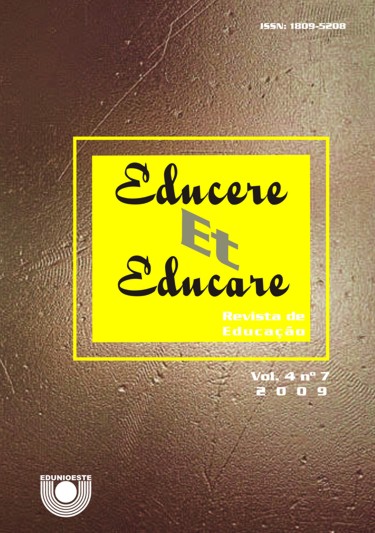ARISTÓTELES: FUNDAMENTOS DO PODER POLÍTICO
DOI:
https://doi.org/10.17648/educare.v4i7.3252Palabras clave:
Aristóteles, Estado, Poder político.Resumen
A discussão em foco é parte de um projeto mais amplo onde se pretende analisar osclássicos da Filosofia e da Ciência Política com o propósito de averiguar como estes estudiosos
fundamentam o poder político. Com este estudo amplo, pretendemos obter um consistente referencial
teórico para o estudo sobre a natureza do Estado contemporâneo e das formas de participação dos
cidadãos nas decisões políticas. Com este propósito, o presente artigo se limita a tratar do
pensamento político de Aristóteles. Portanto, trata-se de averiguar, aqui, como Aristóteles concebe a
origem do Estado e, assim, como ele fundamenta o poder político. Nas análises, pôde-se observar
que, ao partir do pressuposto de que tudo o que ocorre no mundo tem uma finalidade, Aristóteles
chegou à conclusão de que o Estado e, com ele, o poder político foram criados pelos homens com a
finalidade de promover a felicidade do cidadão e, assim, de todos os membros da coletividade. No
entendimento de Aristóteles, uma vez que a finalidade do Estado é a promoção da felicidade, o mais
adequado seria que apenas os homens livres, habilitados por natureza para o desempenho das
funções políticas, devessem participar das decisões políticas. Mais do que isto, o estudo permitiu
observar que embora Aristóteles tivesse a preocupação em empreender um estudo objetivo dos
fenômenos políticos, ele não deixou de emitir seu juízo de valor acerca da melhor forma de governo.
Descargas
Publicado
01-01-2000
Cómo citar
SILVA, J. O. da. ARISTÓTELES: FUNDAMENTOS DO PODER POLÍTICO. Educere et Educare, [S. l.], v. 4, n. 7, p. p. 295–312, 2000. DOI: 10.17648/educare.v4i7.3252. Disponível em: https://e-revista.unioeste.br/index.php/educereeteducare/article/view/3252. Acesso em: 17 dic. 2025.
Número
Sección
Fundamentos da Educação
Licencia
Aviso de Direito Autoral Creative Commons
Política para Periódicos de Acesso Livre
Autores que publicam nesta revista concordam com os seguintes termos:
1. Autores mantém os direitos autorais e concedem à revista o direito de primeira publicação, com o trabalho simultaneamente licenciado sob a Licença Creative Commons Attribution que permite o compartilhamento do trabalho com reconhecimento da autoria e publicação inicial nesta revista.2. Autores têm autorização para assumir contratos adicionais separadamente, para distribuição não-exclusiva da versão do trabalho publicada nesta revista (ex.: publicar em repositório institucional ou como capítulo de livro), com reconhecimento de autoria e publicação inicial nesta revista.
3. Autores têm permissão e são estimulados a publicar e distribuir seu trabalho online (ex.: em repositórios institucionais ou na sua página pessoal) a qualquer ponto antes ou durante o processo editorial, já que isso pode gerar alterações produtivas, bem como aumentar o impacto e a citação do trabalho publicado (Veja O Efeito do Acesso Livre).
Licença Creative Commons
Esta obra está licenciada com uma Licença Creative Commons Atribuição-NãoComercial-CompartilhaIgual 4.0 Internacional, o que permite compartilhar, copiar, distribuir, exibir, reproduzir, a totalidade ou partes desde que não tenha objetivo comercial e sejam citados os autores e a fonte.


